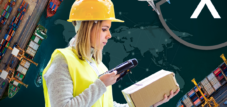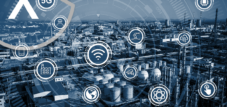Without sensor technology, nothing works in cities and the economy: Sensors for IoT & Industry 4.0 | Industrial & City Metaverse
Language selection 📢
Published on: July 10, 2024 / Update from: July 10, 2024 - Author: Konrad Wolfenstein

Sensor technology in cities and the economy: Sensors for IoT & Industry 4.0 | Industrial & City Metaverse – Image: Xpert.Digital
🤖💡 The goal of artificial intelligence (AI), digital technologies and technological expertise in mechanical engineering
🌟 The aim of artificial intelligence (AI), digital technologies and technological expertise in mechanical engineering consists in automation as well as the creation of scalability and flexibility in products and machines. This development affects various industrial areas, including logistics in the warehouse or other industrial segments. Examples of technologies used are scanners, measurement sensors, pressure sensors, temperature sensors and inclination sensors. Sensors are particularly important in the growing area of “smart city” and form the lifeline of the urban infrastructure.
📊📡 Without the extensive integration of sensor technology
Without the extensive integration of sensor technology, neither the concept of the Industrial Metaverse nor the realization of Industry 4.0 or similar initiatives would be conceivable. Sensor technology acts as the basis and crucial interface for the economic and urban future as well as for the development of digital twins.
📉🛠️ This means in detail
In detail, this means that sensors provide the data basis on which modern industrial and urban applications are built. These sensors record a wide range of information that is processed in real time to optimize processes and make them more efficient. In logistics, scanners and measuring sensors enable precise inventory management and inventory. Pressure and temperature sensors are essential in industrial manufacturing as they monitor the conditions under which machines and systems operate in order to maximize their performance and service life.
🌡️📏 Temperature sensors also play a crucial role
Temperature sensors also play a crucial role in monitoring and controlling environmental conditions, be it in cold stores or in monitoring production processes where specific temperatures must be maintained. Pressure sensors are used to monitor pressure conditions in various industrial applications, for example in hydraulic or pneumatic systems. Tilt sensors, on the other hand, are used in a variety of industries, from construction to aerospace, to precisely control the orientation and movement of objects.
🔧🔍 Technological advances in sensor technology
Technological advances in sensor technology have enabled applications such as predictive maintenance. Sensor data is used to monitor the condition of machines in real time and to detect potential failures at an early stage. This allows maintenance to be carried out as needed rather than relying on set intervals, significantly improving the efficiency and lifespan of machines.
🌆🌿 In the Smart City
In the Smart City, sensors are also used in many areas. From air quality monitoring to traffic flow analysis to smart street lighting, sensors collect and deliver the necessary data from which smart urban decisions can be made. By networking these sensors, complex systems are created that make life in urban areas safer, more environmentally friendly and more efficient.
📈🏙️ “The future of urban development lies in the intelligent networking of infrastructure and data”
“The future of urban development lies in the intelligent networking of infrastructure and data,” one could argue. Sensor technology plays an essential role in creating a sustainable and efficient urban living space. Digital twins, i.e. virtual representations of physical objects, systems or cities, are based on the continuous streams of data generated by sensors. These digital twins make it possible to simulate and analyze complex scenarios, allowing more effective decisions to be made.
🚦🏢 An example of the application of digital twins
An example of the application of digital twins can be found in urban planning. By simulating different traffic situations or environmental conditions, urban planners can evaluate the impact of new infrastructure projects in advance. This reduces the risk of poor planning and increases the efficiency and sustainability of urban development.
🏭💻 “Industry 4.0”, the concept of the fourth industrial revolution
“Industry 4.0”, the concept of the fourth industrial revolution, takes the digitalization of production to a new level. The entire production chain is networked and monitored in real time. Sensor technologies enable the seamless integration of production systems and the capture of operational data in real time. This leads to highly flexible, adaptive production that can respond to individual customer requests.
🕶️🔬 In the context of the Industrial Metaverse
In the context of the Industrial Metaverse, the combination of sensors, machine learning and advanced 3D visualizations opens up new possibilities. Companies can create virtual copies of their production facilities and use them to test different production scenarios before making physical changes. This not only minimizes costs and risks, but also promotes innovation through experimentation in a secure, digital environment.
🌐🛡️ Another growing area through the use of sensor technology
Another growing area through the use of sensor technology is the remote monitoring and control of industrial systems. With the connection to the Internet of Things (IoT), companies can access and monitor their systems worldwide, regardless of location or time. This enables unprecedented flexibility and responsiveness, especially in critical industrial applications.
🤔💡 In the long term, the continuous development of sensor technology will help
In the long term, the continuous development of sensor technology will help machines and systems become more intelligent and autonomous. For example, scientists are developing sensors that not only collect data but can also process it directly on site. This so-called “edge computing” technology enables rapid data processing and analysis at the point of origin, minimizing latency and reducing data protection concerns.
🚀🌍 In addition, more and more precise and reliable sensors are coming onto the market
In addition, more and more precise and reliable sensors are coming onto the market that can also be used in extreme environments, be it under strong mechanical loads, extreme temperatures or corrosive conditions. This robustness significantly expands the application possibilities of the sensors and makes them a key component of modern industrial systems.
🏙️🔄 The comprehensive integration of AI and digital technologies in mechanical engineering
The comprehensive integration of AI and digital technologies in mechanical engineering and industry will lead to a significant transformation of production processes and urban infrastructure in the long term. Through the increased use of sensor technologies and the associated data analysis, it will be possible not only to automate processes, but also to make them flexible and scalable, which will significantly increase profitability and sustainability. The future of these technologies promises an era in which efficiency and innovation are closely linked, supported by a solid foundation of sensor technology and data intelligence.
📣 Similar topics
- 🤖 The role of AI and digital technologies in mechanical engineering
- 🌡️ Temperature sensors: key factors for industry and logistics
- 🏢 Smart Cities: Sensors as the foundation of modern urban infrastructures
- 🔄 Predictive maintenance through advanced sensor technology
- 📊 Pressure sensors: Supporters for precise industrial applications
- 🕶️ Industrial Metaverse: New dimensions through sensors and 3D visualizations
- 💡 Tilt sensors in industry: applications and advantages
- 🌐 IoT and remote monitoring: revolution in the industrial sector
- 💻 Industry 4.0: Integration and real-time monitoring through sensors
- 🏙️ Air quality, traffic flow and lighting: Smart City sensors in use
#️⃣ Hashtags: #Sensortechnology #Industrie4.0 #SmartCity #Forward-LookingMaintenance #Digital Twin
Our recommendation: 🌍 Limitless reach 🔗 Networked 🌐 Multilingual 💪 Strong sales: 💡 Authentic with strategy 🚀 Innovation meets 🧠 Intuition
At a time when a company's digital presence determines its success, the challenge is how to make this presence authentic, individual and far-reaching. Xpert.Digital offers an innovative solution that positions itself as an intersection between an industry hub, a blog and a brand ambassador. It combines the advantages of communication and sales channels in a single platform and enables publication in 18 different languages. The cooperation with partner portals and the possibility of publishing articles on Google News and a press distribution list with around 8,000 journalists and readers maximize the reach and visibility of the content. This represents an essential factor in external sales & marketing (SMarketing).
More about it here:
🌐 🚀 According to sensor technology, the 5G network or the private 5G campus networks are crucial for the industrial and city metaverse
🏙️🏗️ Nowadays, the integration of various technical innovations represents significant progress for industry and urban living spaces. In addition to the important role of sensor technology, which forms the basis for many modern applications, is the 5G network or private 5G -Campus networks crucial to the Industrial and City Metaverse. These new network technologies offer not only higher transmission speeds, but also lower latency and greater reliability, which has far-reaching implications for various industries and urban infrastructures.
📡 Technology and transfer speeds 📈
5G networks have the potential to fundamentally change the way data is transmitted and processed in real time. In the Industrial Metaverse, where digital twins and predictive maintenance are becoming increasingly important, 5G networks enable seamless and rapid communication between machines, sensors and central control systems. The high data transfer speed and low latency allow immense amounts of data to be processed in real time, allowing precise monitoring and control of industrial systems. This leads to an optimization of production processes as problems can be identified and solved more quickly.
🏢 Networks and Enterprise Applications 📡
Private 5G campus networks also offer the opportunity to create dedicated network infrastructures for companies that are specifically tailored to their individual needs. These networks are particularly important in environments where data security and network reliability are top priorities. This allows companies to operate their own communication networks, which not only increases security but also improves control over the use and distribution of resources. By integrating these private networks into the Industrial Metaverse, companies can monitor and control their production facilities in real time, enabling unprecedented flexibility and efficiency.
🏙️ Smart cities and connected devices 🌐
Another key element of 5G technology is support for a large number of devices to be connected and active at the same time. This is particularly relevant to the concept of the smart city, in which countless sensors and connected devices are used to monitor and control urban infrastructures. From traffic control to public safety to energy and water supply, 5G makes it possible to connect these devices efficiently and process the diverse data they generate in real time.
🚗 Autonomous vehicles and communication 📶
The higher bandwidth and reliability of 5G networks also mean an improvement in the communications technologies needed to support autonomous vehicles. These vehicles, intended to become an integral part of smart cities, require continuous and instantaneous communication with the environment and each other in order to function safely and efficiently. 5G ensures that the massive amounts of data needed for navigation and decision-making can be transmitted without delays and failures.
🌍 Global integration and collaboration 🏭
In industrial environments, 5G networks can improve collaboration and integration between different manufacturing sites worldwide. Companies can monitor and control production lines and processes in real time, regardless of where their factories or warehouses are located. This is particularly important in a globalized economy, where production facilities are often far apart and close coordination is necessary to ensure maximum efficiency.
🕶️ Augmented reality (AR) and virtual reality (VR) 🌌
An interesting application of 5G in industry is the concept of augmented reality (AR) and virtual reality (VR). Leveraging 5G will enable AR and VR applications to operate with low latency and high bandwidth, which is hugely useful in production environments. For example, maintenance personnel can receive real-time instructions and information via AR glasses while working on machines. This not only improves efficiency but also reduces the likelihood of errors.
🔧 Predictive maintenance and AI 🧠
The development of the Industrial Metaverse, based on the combination of sensor technology, AI and 5G, enables significant advances in predictive maintenance. Sensors continuously provide data about the status of machines and systems, while 5G networks immediately transmit this data for analysis. AI-powered systems can use this information to detect anomalies and predict maintenance needs before costly failures occur. This leads to a reduction in unplanned downtime and extends the life of the machines, which both saves costs and increases productivity.
🚦 Intelligent transport systems and security 🛣️
In the urban environment, 5G technology contributes to the development of intelligent transport systems that optimize traffic flow and increase road safety. Sensors and cameras installed on traffic routes collect data about vehicle movements and traffic conditions. This data is sent over 5G networks to central control systems capable of adjusting traffic signals in real time to reduce congestion and improve traffic flow. In addition, these systems can allow emergency services to get to accident scenes more quickly, significantly reducing response times.
💊 Healthcare industry and telemedicine 🏥
5G also opens up new possibilities in the healthcare industry. Telemedicine and remote surgery are application areas that benefit from the high bandwidth and low latency of 5G networks. Doctors can remotely view real-time patient data and make diagnoses or even perform surgical procedures via robotic arms controlled via 5G. These innovations improve medical care, especially in remote or underserved areas.
⚡ Energy industry and smart grids 🌍
The integration of 5G into the energy industry is also significant. Smart grids use sensors and communication networks to monitor and control energy consumption in real time. 5G enables faster and more reliable transmission of this data, resulting in more efficient use of energy sources and a better balance between supply and demand. This is particularly important with regard to the integration of renewable energies, which often have variable production quantities.
🤖 Edge computing and data processing 📊
A notable benefit of 5G technology is its support for edge computing, where data processing and analysis occurs closer to data sources. This significantly reduces latency and ensures that data-intensive applications work quickly and efficiently. In industrial applications, machines and sensors can process their data locally and only send relevant information to central systems, reducing network load and improving response times.
🌆 Development of the Industrial and City Metaverse 🌐
The integration of 5G networks and private 5G campus networks have a significant impact on the development of the industrial and city metaverse. They provide the necessary infrastructure to transmit large amounts of data quickly and reliably, which forms the basis for numerous innovative applications and processes. The combination of sensor technology, AI and 5G networks makes it possible to make industrial and urban infrastructures more efficient, flexible and scalable. This leads to a significant improvement in economic efficiency and sustainability and paves the way for a more intelligently connected future.
📣 Similar topics
- 🌟 The revolution of the industrial and city metaverse through 5G
- 🏭 5G campus networks: The future of industrial communication
- 🌉 Smart cities: How 5G is transforming urban infrastructure
- 🚀 Real-time data processing in the Industrial Metaverse through 5G
- 🔒 Security and control: Benefits of private 5G networks for businesses
- 🌐 Global production networking and integration through 5G
- 🔧 Efficient predictive maintenance thanks to 5G and AI
- 🛣️ Intelligent transport systems through 5G technology
- 🩺 Advances in telemedicine thanks to 5G networks
- ⚡ 5G and Edge Computing: A new era of computing
#️⃣ Hashtags: #IndustrialMetaverse #5GNetworks #SmartCities #PredictiveMaintenance #EdgeComputing
We are there for you - advice - planning - implementation - project management
☑️ SME support in strategy, consulting, planning and implementation
☑️ Creation or realignment of the digital strategy and digitalization
☑️ Expansion and optimization of international sales processes
☑️ Global & Digital B2B trading platforms
☑️ Pioneer Business Development
I would be happy to serve as your personal advisor.
You can contact me by filling out the contact form below or simply call me on +49 89 89 674 804 (Munich) .
I'm looking forward to our joint project.
Xpert.Digital - Konrad Wolfenstein
Xpert.Digital is a hub for industry with a focus on digitalization, mechanical engineering, logistics/intralogistics and photovoltaics.
With our 360° business development solution, we support well-known companies from new business to after sales.
Market intelligence, smarketing, marketing automation, content development, PR, mail campaigns, personalized social media and lead nurturing are part of our digital tools.
You can find out more at: www.xpert.digital - www.xpert.solar - www.xpert.plus



























